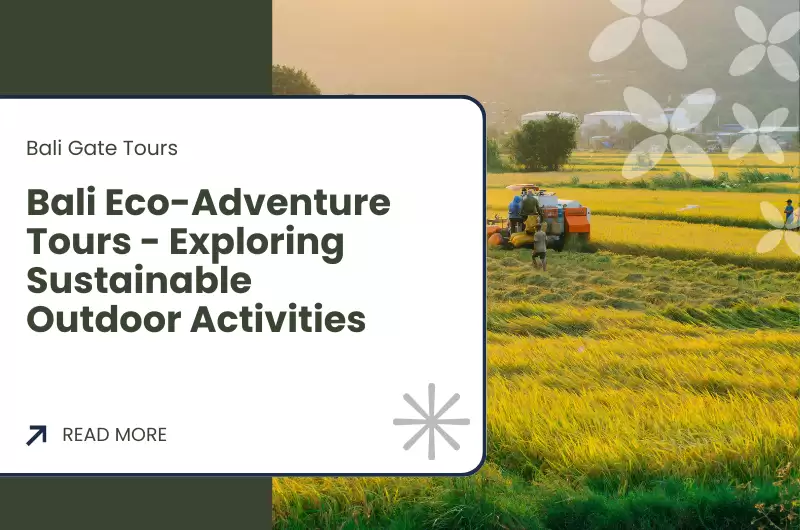Bali Eco-Adventure Tours - Exploring Sustainable Outdoor Activities

Bali has long been celebrated for its stunning beaches, lush rice terraces, and vibrant culture, but beyond the typical tourist trails lies a world of eco-adventure tours that immerse travelers in the island’s natural beauty while promoting sustainable tourism. These experiences allow visitors to explore Bali responsibly, combining adrenaline-fueled adventures with environmental awareness and community engagement.
Sustainable Trekking in Bali’s Forests
One of the most compelling sustainable outdoor activities is trekking through Bali’s rich forest landscapes. From the misty hills of Munduk to the dense jungles near Ubud, guided eco-treks provide an intimate look at native flora and fauna while adhering to eco-conscious practices. Knowledgeable local guides teach hikers about conservation efforts, endemic species, and the cultural significance of certain plants and trees, turning a simple hike into a meaningful educational experience. Trekking on designated paths and minimizing impact ensures that these eco-adventure tours leave the forest as pristine as it was found.
Cycling Through Rice Terraces and Villages
Another popular offering in Bali eco-adventure tours is cycling through the island’s terraced landscapes. Routes often wind through traditional villages, passing intricate subak rice terraces, and giving travelers a glimpse of local agricultural practices. This low-impact activity encourages exploration without harming the environment, and stops along the way allow participants to interact with local farmers and sample fresh, organic produce. Cycling not only strengthens the connection with nature but also highlights sustainable outdoor activities that support rural communities.
River Adventures with Environmental Awareness
For thrill-seekers, Bali’s rivers offer opportunities for eco-adventure tours such as rafting and kayaking. But these experiences differ from conventional tours because they integrate environmental stewardship. Operators often conduct river clean-ups, educate participants about the importance of clean waterways, and use sustainable materials for equipment. Navigating the white-water rapids of the Ayung or Telaga Waja rivers, travelers feel the rush of adventure while contributing to the preservation of Bali’s delicate aquatic ecosystems.
Wildlife Encounters and Eco-Conservation
A crucial aspect of sustainable outdoor activities in Bali involves ethical wildlife experiences. Eco-tours may include visits to rehabilitation centers, butterfly gardens, or wildlife sanctuaries where tourists learn about conservation programs and the efforts to protect endangered species. Observing Bali’s monkeys, exotic birds, and sea turtles in environments designed for their wellbeing ensures that tourism supports, rather than disrupts, the local ecosystems. Participants leave not only with memories but also a heightened sense of responsibility toward nature.
Eco-Friendly Surfing and Coastal Exploration
Bali’s coastline is famous for its waves, and eco-conscious surf schools have begun to merge adventure with sustainability. Lessons often include discussions on ocean conservation, reef preservation, and the impact of plastic waste on marine life. Surfers practice on beaches where operators prioritize clean-up initiatives and environmentally friendly equipment, highlighting how Bali eco-adventure tours can combine fun with stewardship. Additionally, guided coastal walks introduce travelers to hidden coves, tide pools, and natural marine habitats, enhancing awareness of the fragile coastal ecosystems.
Agro-Tourism and Local Community Engagement
Sustainability in Bali isn’t just about nature; it’s about people, too. Many eco-adventure tours integrate agro-tourism experiences, where travelers participate in farming activities, learn about traditional irrigation methods, or help prepare local meals. These interactions support community-based tourism, provide fair income to local farmers, and offer visitors a culturally rich, hands-on experience. By engaging directly with Balinese villagers, tourists gain insights into the island’s sustainable practices, from organic farming to traditional cooking techniques.
Volcano Trekking and Responsible Exploration
Bali’s volcanic landscapes provide thrilling options for sustainable outdoor activities. Treks up Mount Batur or Mount Agung can be part of eco-adventure packages that emphasize responsible travel. Guides ensure hikers stay on designated paths, respect sacred sites, and minimize environmental impact. Participants learn about volcanic geology, the role of lava in enriching soils, and local spiritual practices, merging adventure with cultural appreciation. Such experiences illustrate how high-altitude exploration can be exhilarating while supporting preservation efforts.
Eco-Stays and Green Accommodations
An essential component of Bali eco-adventure tours is the accommodation. Many tour operators partner with eco-friendly resorts and lodges that implement solar energy, water recycling, and organic food sourcing. Staying in these establishments enhances the overall sustainable experience, allowing visitors to rest comfortably while minimizing their ecological footprint. These green stays often feature native landscaping, composting systems, and local art, integrating environmental mindfulness into every aspect of the trip.
Combining Adventure with Education
The hallmark of sustainable outdoor activities in Bali is their educational element. Eco-adventure tours don’t merely entertain; they inform. Travelers learn about environmental challenges, conservation projects, and community initiatives. Workshops on reef preservation, sustainable agriculture, or wildlife protection are often included in multi-day itineraries. This combination of adventure and learning ensures that participants leave with actionable knowledge and a deeper appreciation for the island’s natural and cultural wealth.
Experiencing Bali Responsibly
Bali’s eco-adventure tours offer more than just excitement—they provide meaningful engagement with nature and culture. From trekking through forests to cycling amidst rice terraces, rafting down pristine rivers, or surfing sustainably, each activity emphasizes environmental consciousness and community support. By participating in these tours, travelers enjoy unforgettable experiences while actively contributing to the preservation of Bali’s landscapes and traditions. Sustainable travel in Bali ensures that the island’s beauty and cultural richness remain vibrant for generations to come, allowing adventure-seekers to explore responsibly and leave a positive impact.










